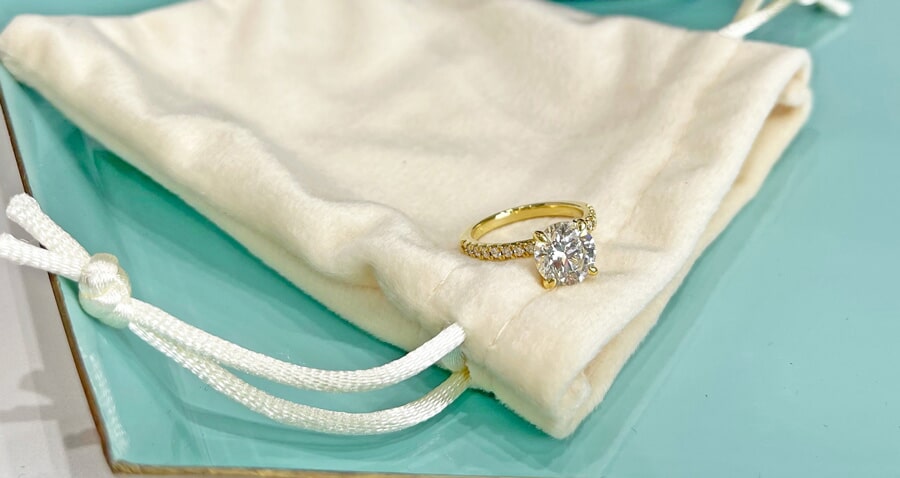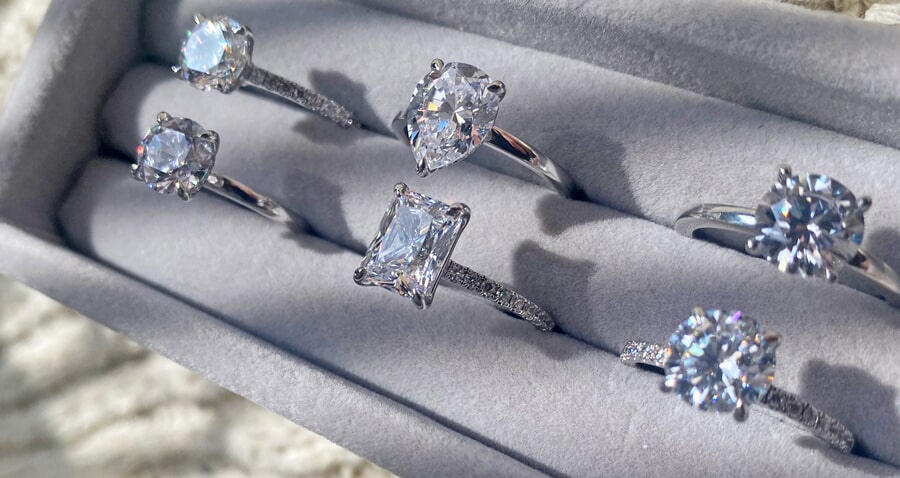Caring For And Cleaning Lab Grown Diamond Rings

THE BASICS: HOW TO TAKE CARE OF YOUR DIAMOND RING
With a little love and care, your lab grown diamond ring will last a lifetime. Let's start with the basics, and then read on for a deeper dive on caring for diamond jewelry so that it lasts forever. Remember, lab diamonds and mined diamonds are chemically and physically the same, so the same care and cleaning instructions apply to both types.
- Remove your ring when working out, gardening, swimming, showering, sleeping, and when you’re doing anything that might be tough on hands or could catch your ring (watch that dog leash — true story!).
- Clean your ring as needed. Oils from your skin, hand soap, body lotions, and general griminess won't hurt your ring — but they will dull its shine. Make it a habit to clean your lab diamond ring regularly, and keep it away from harsher materials like bleach and household cleaners. Corrosive chemicals can damage precious metal alloys.
- Get a pro to inspect your ring annually. We recommend that clients have their rings professionally inspected every year to check for loose and broken prongs. Expect normal wear and tear, and because we use our hands every day, accidents can happen. It’s easy to bump and scrape delicate jewelry, knocking diamonds loose from their settings. Read about our lifetime warranty, which includes an annual ring spa treatment.
- We recommend insuring your ring through a reputable insurance company; most couples can start with their homeowners or renters insurer to explore policy options. We’ve also heard good things about Jewelers Mutual.
HOW TO CLEAN A DIAMOND RING AT HOME
We recommend a very simple cleaning regime for at-home cleaning. People are surprised by how easy and low-tech it is to get a lab grown diamond ring sparkly clean —
@labgrowndiamonds How to clean your diamond ring! 💍✨ #diamonds #diamondclean #labgrowndiamond #howto #engagementring ♬ Lazy Sunday - Official Sound Studio
- Add a little dish soap to a bowl of warm water.
- Let your ring soak for a few minutes.
- Use a soft toothbrush to gently scrub away grime, especially around prongs and under diamonds where buildup is likely.
- Rinse and pat dry.
- More cleaning tips: Natural oils from our skin will quickly dull any diamond's luster. Do your best not to touch the top of your diamond, where smudges and grime will be most noticeable. If you'd like something simple for on-the-go cleaning, we've tried and liked Clean + Care: Sparkle + Shine Sticks.

CARING FOR YOUR DIAMOND RING
Diamond jewelry requires a little TLC to stay clean and safe, so it's a good idea to take time to learn how to care for it. True, diamond is among the hardest substances on earth. However, diamonds have some degree of brittleness, and they are not indestructible.
One look at a vintage diamond will often demonstrate that diamonds can break; old diamonds that have been worn and loved are often chipped, sometimes broken. Diamond edges chip when hit with force, and significantly included diamonds will have weak spots. These weak spots can make the diamond prone to breakage.
Be gentle on your hands when you're wearing jewelry. Wedding and engagement rings are meant to be worn every day, but they are vulnerable to damage and should be treated like fine jewelry. Especially very slim and delicate designs, which are very popular right now. Here's a list of everyday activities that are likely to damage your rings.
TAKE OFF YOUR RINGS WHEN YOU ARE:
- LIFTING WEIGHTS! We cry at the gym when we see this, which is way too often. Gold and platinum are both much softer than kettlebells, free weights, barbells, etc. The band of your ring will scratch like crazy, and your diamonds might chip or be knocked loose.
- Swimming and showering. The biggest risk here is losing your ring to surf or sewer. We don't recommend wearing your ring in the pool either, because chlorine can harm precious metal alloys.
- Gardening. Think about it: your hands are shoved in gloves where your rings are smashed together and under pressure. Just not good.
- Washing dishes. Mainly because you might lose your rings down the sink, but it's also possible to bang rings on pots and pans while you're scrubbing away. And no one wants a dreaded garbage disposal incident.
- Sleeping. Sounds strange, but you can damage your ring — or yourself — while asleep. If you're an active sleeper, you might even bang your hand against someone's face. In any case, our fingers swell at night, which over time can bend rings out of shape.
- Putting your ring at risk for getting snagged or smashed in any way is a bad idea. Dog leashes, rock climbing harnesses, other exercises... if in doubt, find a safe alternative to wearing your ring on your hand. Which brings us to our next and final tip:
- Store your ring in a ring box, soft pouch, or in a small dish when it's not safe to wear it. Keep jewelry separate so your pieces don't scratch. Diamonds, being extremely hard, will scratch metals and other gemstones. Plum rings come with a soft pouch and ring box, and you can also try a ring wristband pocket like Your Ring Hero
For more tips, be sure to sign up to our mailing list. Join us for Rings & Things and never miss news and specials. Sign up now.



